For a long time writing lived in separate spheres for me. There was writing for art (poetry, fiction, or serious creative non-fiction) which used more creative license. Then there was personal journaling, not meant for others, just recording and processing life like a conversation with one’s self. Then, there was writing for business, which was more formal and matter of fact. Three different, separate things.
Early in my career, I’m not sure if I would have had the confidence to use my own voice or get overly creative in my work-related writing—especially representing a nonprofit with a formal culture. It certainly wasn’t the norm to do so. Pantyhose were required as part of our dress code, to give you an idea of the situation.
Luckily, I gave up pantyhose and opted for workplaces that valued unique voices. Trends to embrace vulnerability and bring your whole self to work encouraged more openness and honesty, including in brand storytelling. I started to see parts of me in work blogs and content that previously only showed up in my journal or in a poem. I found that I was a much more productive when I could be myself. Writing was becoming less fractured, yet there were more pieces to put together.
I had not even realized how compartmentalized writing was for me until a writing workshop last summer at a women’s retreat, Oiselle’s Big Bird Camp. Nestled amongst tall pines and steep hills in Pennsylvania, the camp focused on running, connection with other women, and workshops about things like wellness and career. Just the sort of place that is ripe for discovery. This is a snapshot from one early morning at camp:

Pro runner and writer, Lauren Fleshman, led the writing workshop with inspiration from Natalie Golberg’s book, Writing Down the Bones. Lauren provided prompts, then set us loose with simple instructions. Keep the pen moving and put down first thoughts. If there is nothing, write the same thing over and over until it goes somewhere else. She calls this wild writing. I had been in a bit of a writing funk with all of my writing outlets including the YAY blog. I realized I needed to allow myself to just go.
I ordered a copy of Goldberg’s book, and it took me even further. Among her rules: Don’t think, don’t cross out, don’t edit. Whoops. I was doing all of those things in copious amounts. It cracked my mind open. I was censoring myself so much before I even put pen to paper (or fingers to keyboard, as is often the case). Generate first, edit later. It’s a lesson I teach in ideation workshops all the time, yet I wasn’t able to apply it to my own writing.
According to Goldberg, writing is a practice, like zen meditation or running or any other craft. Just show up and fill the page. You can decide what to cut, what to continue, what to leave alone at a later time. All of it, she says, is “compost” for future writing. I love this idea of writing as a practice, with regular sessions and drill or exercises to flex different writing muscles.
Goldberg describes how to use “writing marathons” to really get down to business, and it smacked me in the face. I’ve been facilitating writing sprints for clients to help them tackle large content needs for website launches or annual reports, and it never occurred to me to use a sprint for my personal writing.
Fast forward to the fall, and another writing workshop, this time focused on memoir with my former writing professor and advisor from university, Margaret McMullan. She said things that complemented lessons from Lauren and Natalie, like this quote I wrote down in my notebook in big, block letters: “You have to feel 155% free. If you feel like someone is watching and judging, it will limit your writing.” YES.
She also brought me back to fundamentals of creative writing. When you’re in the zone, or as she calls it “La-La Land,” keep going. Ask yourself, What else do you see, smell, taste, feel, hear? Bring all the senses to writing. This is how you put someone else right there with you. These details help people live through your writing, as if these experiences were their own.
More, YES. I can blog about YAY work with an open heart. I can and should use alliteration or metaphor in business writing. I can take liberties with language. I can use sprints for any kind of writing I want. It is not three different things, but one big practice. This is writing unfractured, no separate selves or rules. I’m enjoying it more and producing more too.
I’ve considered offering a writing workshop through YAY. Send me a note if you would be interested, as I’d likely pilot it with a small group before offering a public workshop!

